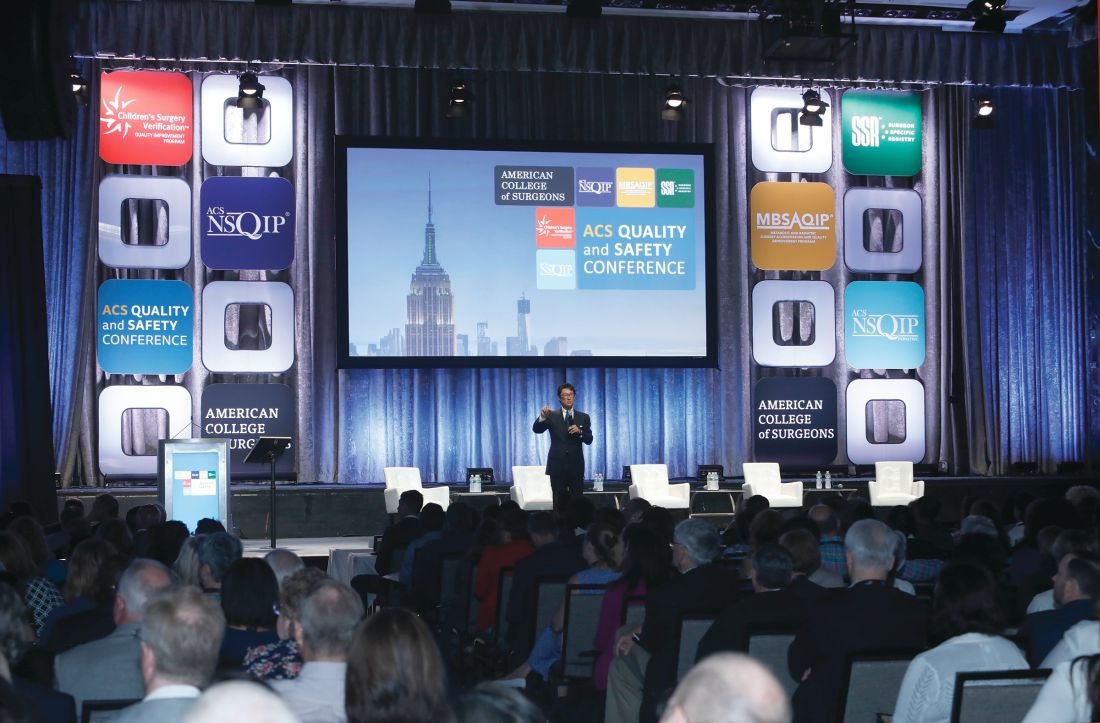Approximately 1,900 individuals who contribute to hospital quality improvement (QI) programs attended the inaugural American College of Surgeons (ACS) Quality and Safety Conference, July 21−24 at the New York Hilton Midtown, NY. The rapid growth of ACS Quality Programs in recent years prompted the expansion of the College’s Annual National Surgical Quality Improvement Program (ACS NSQIP®) Conference to include a more comprehensive look at not only ACS NSQIP Adult and Pediatric, but also the Metabolic and Bariatric Surgery Accreditation and Quality Improvement Program (MBSAQIP®), the Children’s Surgery Verification (CSV) Quality Improvement Program, and the Surgeon Specific Registry (SSR).
According to Clifford Y. Ko, MD, MS, MSHS, FACS, Director of the ACS Division of Research and Optimal Patient Care, the conference was designed to provide attendees with insights into innovative processes to approach the evolving health care quality landscape and improve patient safety, which was clear in the conference theme, Achieving Quality: Present and Future. “As leaders in the quality and safety arena, we must all continue to challenge ourselves to take the quality of care we provide to the next level,” Dr. Ko said.In addition to providing details about the work of the aforementioned ACS Quality Programs, the conference also covered included discussion of the new ACS quality manual, the reconstructed SSR, and programs for improving surgical recovery and outcomes for geriatric surgery patients. The quality manual, Optimal Resources for Surgical Quality and Safety, was provided to all conference attendees and is intended to serve as a resource for surgical leaders seeking to improve patient care in their institutions, departments, and practices.
David B. Hoyt, ACS Executive Director, spoke about the SSR, explaining how it will be part of of the “registry of the future,” allowing users to eventually incorporate relevant data across individual ACS Quality Programs. Also discussed were the Agency for Healthcare Research and Quality Safety Program for Improving Surgical Care and Recovery and the Coalition for Quality in Geriatric Surgery, supported by the John A. Hartford Foundation—programs that seek to set standards and improve outcomes in surgical patients.
The Keynote Address was provided by Blake Haxton, JD, who lost both of his legs to necrotizing fasciitis. Mr. Haxton described his journey from going to the local hospital’s emergency department with debilitating swelling and redness in his right leg to reclaiming his identity, and how he learned that “essential worth is intrinsic and unearned.”
Speakers at the conference addressed a number of hot issues in health care, including health policy, opioid abuse, patient-reported outcomes (PROs), and disparities in care.
A topic of considerable interest was how important culture change is for any sustained QI effort. For any QI effort to succeed it has to evolve in a culture that accepts change, acknowledges shortcomings, uses data to find strengths and weaknesses, and demonstrates resilience. Two cultural changes that surgical teams have experienced in recent years include a greater emphasis on process improvement and checklists.
To read a more detailed account of the topics covered at the conference, read the October Bulletin at URL TO COME. The 2018 ACS Quality and Safety Conference will be held July 21–24 in Orlando, FL.

